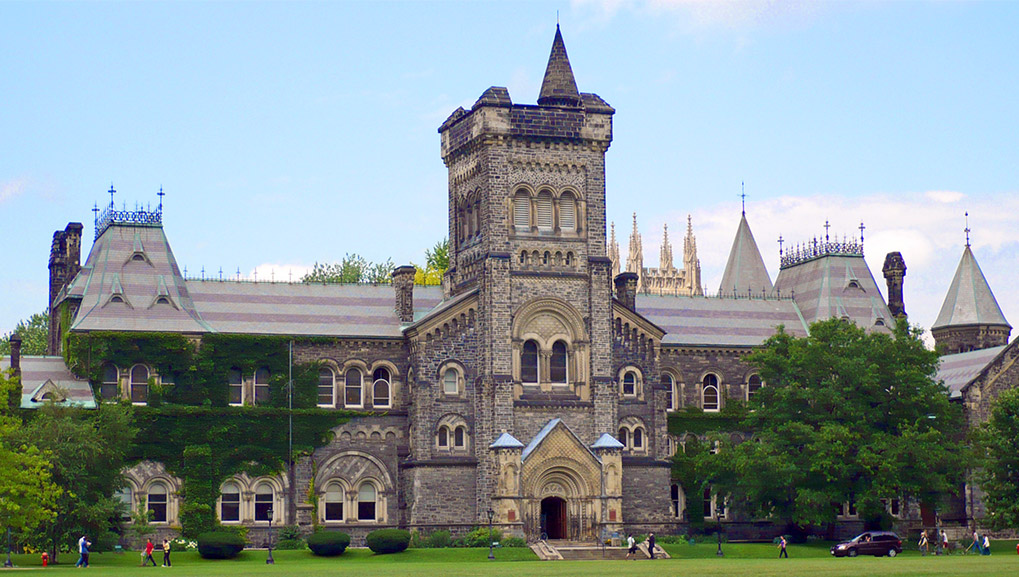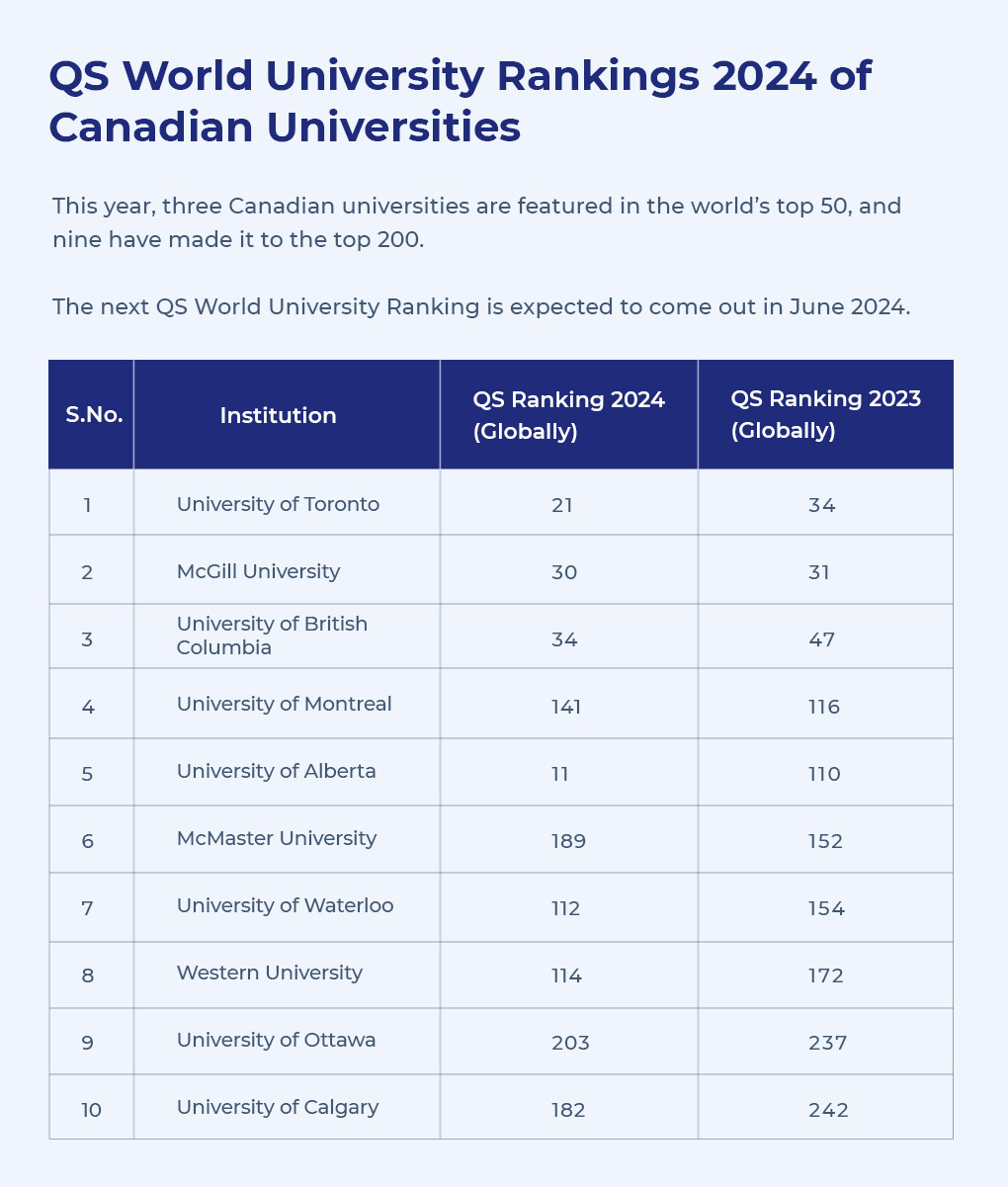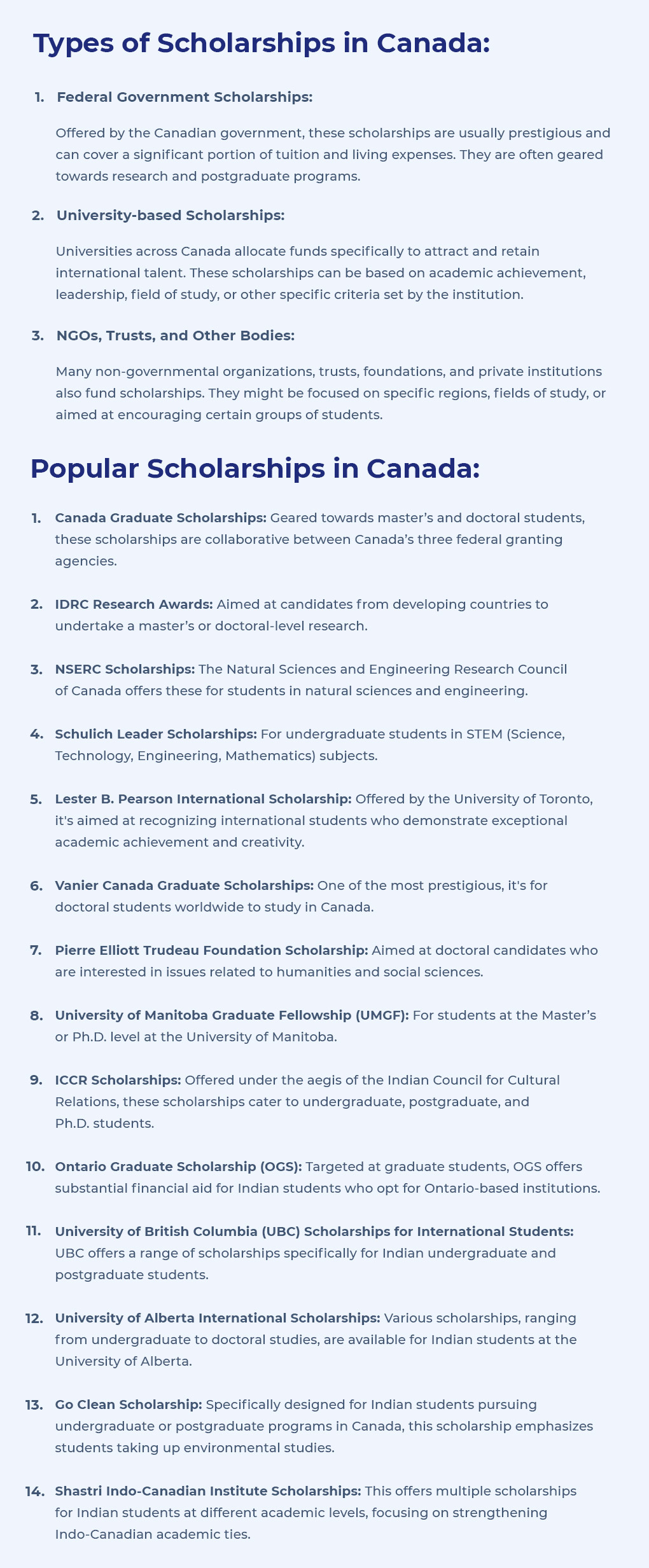

Canada has swiftly emerged as one of the top destinations for international students, particularly from India. With its welcoming society, world-class educational institutions, and opportunities for post-study work and immigration, it's no surprise that many Indian students are drawn to Canada for their higher education. Let's delve deeper into the compelling reasons:

Canada is home to numerous globally recognized universities and colleges. Institutions such as the University of Toronto, University of British Columbia, and McGill University consistently rank among the top in the world. The Canadian education system focuses on research and practical application, ensuring students receive a holistic education.
The QS World University Rankings is an annual publication of higher education rankings developed by Quacquarelli Symonds, a UK-based educational agency.
Initially introduced in 2004, it was a collaborative effort with Times Higher Education and was titled "Times Higher Education – QS World University Rankings." However, by 2009, both parties decided to independently release their own sets of rankings.
The QS approach evaluates universities based on their global reputation and offers insights into specific academic subjects, encompassing 48 distinct areas and five faculty domains, as well as incorporating five regional lists.
The assessment factors in:
This methodology ensures a comprehensive view of the standing of universities worldwide.


Choosing a country for higher education is a significant decision, and the cost is undoubtedly a major factor. When it comes to offering quality education at an affordable rate, Canada stands out as a top choice for many international students, including those from India. Here’s a closer look at why Canada is an economical option:
Canada, a global leader in higher education, has been actively encouraging international students to pursue their academic dreams within its borders.
Recognizing the financial constraints that can deter promising students, Canada has established a plethora of scholarships, ensuring that deserving candidates have access to the world-class education it offers. This gesture not only aids students but enriches the diverse fabric of Canadian academic institutions.

Each scholarship comes with its unique set of criteria, application procedures, and deadlines. While academic excellence remains a common theme, factors such as leadership, community involvement, extracurricular achievements, and specific research interests can be equally important. Here are some Tips from PFEC Global:

Canada, known for its scenic beauty and vibrant multicultural landscape, is not just a top tourist destination but also a hotspot for global professionals. The vast expanse of Canada's economy means that it is brimming with job opportunities in a myriad of sectors.

For many, studying abroad is not just a pursuit of higher education but also an opportunity to explore pathways to permanent settlement in a new country. Canada, known for its immigrant-friendly policies, stands out as an excellent choice for this venture. Here's a closer look at why Canada offers promising immigration opportunities, especially for international students.
International students, by virtue of spending several years in Canada for their education, have a unique advantage. They experience firsthand the nuances of Canadian life, from its vibrant multicultural communities to its rigorous academic standards. This time spent enables them to understand and assimilate into the Canadian way of life, making them well-equipped to become future residents or even citizens.
Post their academic journey, international students have the opportunity to work in Canada for up to three years, thanks to the Post-Graduation Work Permit Program. This period allows them to immerse themselves in the Canadian professional environment. They can comprehend the work ethics, industry standards, and even establish a network, which becomes invaluable if they choose to settle permanently.
The increasing number of Indian students choosing Canada for their higher education is noteworthy. As per data released by IRCC, 2018 saw an impressive intake of around 356,875 international students. Of this number, a significant 107,505 students hailed from India. This represents an increase of approximately 30% from the previous year, 2017. Such statistics underscore the growing appeal of Canada as a preferred education and potentially long-term destination among Indian students.

Canada recognizes the value that international students bring, not just in academic settings but also in the workforce. Hence, after completing their studies:
Canada, known for its scenic beauty and world-class educational institutions, also stands as a beacon of cultural diversity and inclusivity. The rich tapestry of its populace is evident in its cities, festivals, and daily life. Let’s explore the depth of Canada’s cultural mosaic.
Canada's diversity is not a recent phenomenon. The country's history is replete with tales of migration, with people from various parts of the world choosing Canada as their new home. Over the decades, immigrants from Europe, Asia, Africa, and other parts of the Americas have woven their unique threads into the Canadian fabric.
What makes Canada particularly special is the warm reception extended to newcomers. The Canadian ethos is built on acceptance and integration. Instead of expecting immigrants to assimilate completely, Canada cherishes and celebrates the uniqueness every group brings. This attitude has fostered an environment where different cultures don't just co-exist but thrive together.
Canada's cultural calendar is a testament to its diversity. Throughout the year, festivals from myriad traditions light up Canadian cities:
In many countries, ethnic festivals are often limited to those communities. But in Canada, a distinguishing feature is the nationwide participation in diverse festivals. Whether it's Eid, Hanukkah, or Caribbean Carnival, the celebrations transcend ethnic boundaries, making every Canadian a part of the festivity.
A walk down a Canadian city street might lead you to aromas of dim sum, butter chicken, poutine, or baklava. The culinary landscape is as diverse as its people, and Canadians pride themselves on the plethora of international cuisines available.
Canada's commitment to cultural diversity is enshrined in its policies and public discourse. Various programs and initiatives are designed to promote multiculturalism and ensure that every Canadian, irrespective of their background, feels valued and represented.

Canada's reputation as a top destination for international students isn't just built on its world-class education system but also its unparalleled quality of life. Let's delve deeper into why Canada stands out in this regard:
In the realm of global safety and peace metrics, Canada consistently outshines. For instance, in the 2018 Global Peace Index, Canada was placed impressively as the sixth most peaceful country in the world. Such a ranking isn't just a statistical number; it reflects the lived experience of both its citizens and international visitors.
As an international student, Canada ensures you aren't treated as an outsider. You're conferred with the same rights and protections as a Canadian citizen. This encompasses rights such as equality before the law, freedom from discrimination, and the right to life, liberty, and security. Such inclusivity ensures that students can focus on their academic pursuits without unwarranted external worries.
Canada's vast landscapes, stretching from the Atlantic to the Pacific, are not just visually mesmerizing but also are pillars of its high environmental quality. Residents benefit from:
One of Canada's proudest achievements is its healthcare system, which is primarily publicly funded and ensures universal coverage for its residents. As an international student, you'll have access to these top-tier healthcare services, ensuring your well-being is always prioritized.
For more information Read our blog “Medical and Health care facilities for International Students in Canada"
Canadian universities have long been recognized as hubs for innovation, pioneering research, and development. The nation's commitment to R&D is evident in its vast array of programs and initiatives that bolster academic investigations and explorations.
The Canadian government plays a pivotal role in ensuring research remains a cornerstone of the higher education sector. They allocate a significant portion of their budget towards funding various research projects. This financial commitment is particularly pronounced in crucial sectors like health sciences, where investigations can lead to breakthroughs in medical treatments and therapies; environmental science, which aligns with Canada’s focus on sustainability and understanding climate change; and engineering, which drives technological and infrastructural advancement.
One of the key attractions for research students is the access to state-of-the-art labs. Canadian universities are home to some of the world’s most advanced research facilities, equipped with the latest tools and technologies necessary for groundbreaking work. These facilities aren’t just restricted to traditionally 'hard' sciences; disciplines across the board, from humanities to social sciences, benefit from these resources.
The quality of research is also enhanced by the presence of a world-class faculty. Many professors and researchers in Canadian universities are internationally recognized in their respective fields. Their expertise and guidance are invaluable for students, providing mentorship and introducing them to international research networks. Collaboration with these experienced professionals often results in published papers in reputable journals and real-world applications of research findings.
In addition to individual research opportunities, Canada also promotes collaborative projects. Universities often partner with industries, other academic institutions, and even governments to tackle global challenges. This interdisciplinary approach not only enriches the research experience for students but also broadens their perspective, exposing them to practical applications of their work.

Canada, the second-largest country in the world by land area, is renowned for its breathtaking natural beauty. Its vast expanse is dotted with landscapes ranging from rugged mountains and dense forests to serene lakes and sprawling coastlines. For international students, these natural wonders don’t just serve as beautiful backdrops; they offer a myriad of recreational opportunities to unwind, refresh, and immerse oneself in adventurous pursuits.
Located in the western part of Canada, the Rocky Mountains, or 'The Rockies' as they are affectionately known, are a mountain range that stretches from the northernmost part of British Columbia to the southern United States. The Canadian Rockies are not just a sight to behold but are also home to several recreational activities. Whether it's hiking in the summer, skiing in the winter, or simply soaking in the natural hot springs, there's something for everyone. Places like Banff and Jasper National Parks are famous for their scenic beauty and wildlife.
To the east, the Atlantic coastline stretches with its rugged cliffs, historic lighthouses, and charming fishing villages. Provinces like Nova Scotia, Newfoundland and Labrador, and New Brunswick offer numerous opportunities for whale watching, sailing, and enjoying fresh seafood by the shore. The Bay of Fundy, known for having the highest tides in the world, is a must-visit, offering a unique coastal landscape and the chance to walk on the ocean floor during low tide.
While the Rockies and the Atlantic coastline are highlights, the vastness of Canada ensures that every province has something unique to offer. Ontario boasts of the magnificent Niagara Falls and countless lakes. Quebec enchants with its beautiful Laurentian Mountains and the scenic St. Lawrence River. The Northern Territories present a chance to witness the magical Northern Lights. And let's not forget the prairies, with their endless horizons and unique sand dunes, or the Pacific coastline in British Columbia, perfect for surfing and spotting orcas.
Canada's diverse landscapes translate into a plethora of recreational activities. Students can indulge in kayaking, mountain biking, rock climbing, and even ice fishing in the colder months. For those less inclined towards adrenaline-pumping activities, the Canadian wilderness offers camping sites, tranquil canoeing experiences, and countless trails for peaceful nature walks.
Apart from being an academic haven, Canada’s natural beauty provides students with the perfect escape from their rigorous academic schedules. Weekends and holidays can be spent exploring a new province, taking up a new outdoor hobby, or simply basking in the country's natural beauty. This not only enhances the student experience but also contributes to their well-being and mental health.

Canada, renowned for its world-class education system, boasts numerous prestigious universities that have been producing successful graduates for years. These graduates, now settled in various parts of the world and in myriad professions, form the backbone of the strong and influential alumni networks associated with Canadian institutions. Let's delve deeper into understanding the power and potential of these networks.
Canadian universities, given their age and reputation, have churned out numerous graduates over the decades. From the University of Toronto and McGill University to the University of British Columbia and the University of Alberta, the number of alumni these universities have is staggering. These alumni are spread across continents, holding positions of influence in diverse sectors.
Given the international recognition of Canadian education, many graduates find opportunities outside Canada. This global dispersal ensures that no matter where a student or alumnus might move, there's a high likelihood of finding a fellow alumnus in the vicinity. Such global connections can be particularly beneficial for those looking to work or settle in other countries.
Many alumni, as they achieve success in their respective fields, give back to their universities in the form of donations, scholarships, or even their time as guest lecturers. This culture of giving back ensures that future generations of students have even better resources and opportunities.

Canadian universities are renowned for their welcoming and inclusive approach towards international students. This commitment stems from an understanding that transitioning to a new educational system, and often, to a new country and culture can be challenging. Let's delve into the myriad ways through which Canadian universities provide support to international students.
Almost every reputed Canadian university houses a dedicated department or office exclusively for international students. Here's what these departments typically offer:
Beyond formal support systems, the larger Canadian community is known for its warmth and openness towards international students. Many cities have community organizations, local clubs, and events aimed at helping international students feel at home.
Canada's prominence on the global stage as a haven for students, professionals, and entrepreneurs isn't just by chance. The country, with its robust economy and forward-thinking policies, has meticulously cultivated an environment that fosters growth, innovation, and stability. Let’s dive into why Canada is a hotbed for myriad opportunities, especially for students and young professionals.

Higher education, in its most potent form, does not solely revolve around classroom lectures, exams, or research papers. It also encompasses real-world experiences that prepare students for their professional journey ahead. Canada's higher education system is a stellar example of this ideology. One of the distinct features of Canadian education is its co-operative work program, commonly known as "co-op."
Co-operative work, at its core, is a structured method of combining classroom-based education with practical work experience. It’s an innovative blend of academic learning and hands-on experience aimed at ensuring students are job-ready by the time they graduate. Unlike internships, which can be pursued in many countries, co-op positions are often paid, and they're woven into the curriculum, making them an essential part of a student's academic journey.
A student enrolled in a co-op program typically alternates between academic semesters and work terms. For instance, an engineering student might spend a semester working for an established engineering company, gaining real-world experience directly related to their field of study. A typical co-op lasts about four months. Therefore, over the span of a four-year degree program that offers co-op, students can amass up to 16 months of valuable Canadian work experience.
For Indian students, choosing Canada for higher education represents more than just an academic decision. It's an opportunity for personal growth, professional development, and building a foundation for a promising future.
The friendly locals, the country's emphasis on inclusivity and diversity, and its commitment to delivering top-notch education make Canada a prime choice for Indian students.
Whether you're looking for cutting-edge research programs, a vibrant campus life, or opportunities to integrate into the Canadian job market post-graduation, Canada has it all.

Studying abroad is an exciting and life-changing experience that offers students a chance to gain a global perspective and valuable exposure ...

In our rapidly globalizing world, where boundaries are melting away and opportunities abound, proficiency in the English language has become ...

Choosing to pursue higher education abroad is an exciting and life-changing decision. Among the plethora of options available to internationa...

Studying abroad is a life-altering adventure that opens doors to new cultures, experiences, and opportunities. Among the plethora of global s...

Australia, renowned for its world-class education and diverse cultural experiences, continues to be a favoured destination for international ...

Australia is not just famous for its iconic Sydney Opera House, the Great Barrier Reef, and its unique wildlife; it is also recognized global...

Studying abroad is a life-changing decision, and with so many options available, it can be overwhelming to choose the right country and univers...

As of March 2022, Australia has seen a consistent rise in its international student numbers, with enrolments reaching 440,219. This marks an ...